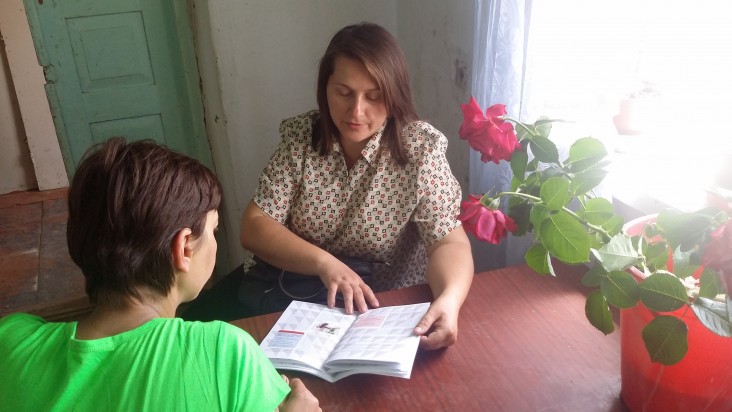
Jan. 2015—When Iryna* enrolled with an unemployment agency in Ukraine, a routine TB screening detected the infection. Iryna believes she contracted TB in 2012 when she worked as an agricultural worker in Kherson alongside a coworker who was diagnosed with the disease.
“When I became ill with TB and was admitted to the hospital, not only my neighbors, but even people in the adjacent district learned about it. Their initial reaction was quite negative. They even forbade my kids to play with their children. It caused me so much pain,” explained the mother of four. “You can imagine how difficult it was to explain to my kids why the other children will not play with them!”
The incidence of TB in Ukraine’s general population is currently estimated to be over 100 cases per 100,000 people, according to the World Health Organization. A study conducted from September 2011 to March 2012 shows that Ukrainians' attitudes toward people with TB (and toward those who have had it but completely recovered) is mixed. On one hand, 92 percent of respondents think that such people should get support and a friendly attitude from other people. On the other hand, things change when the situation affects them personally. For example, only 45 percent of respondents said they would not be reluctant to work alongside such a person. Only 33 percent would agree to eat at a restaurant if they knew that one of the cooks or waitresses has had TB and completely recovered.
In May 2014, Iryna became one of the first patients in a joint program launched by USAID and the Ukrainian Red Cross Society to support patients diagnosed with TB in overcoming obstacles to treatment.
The program enabled Iryna to forego daily visits to a treatment center by having a visiting nurse come directly to her. “Now the situation is a bit better. I am very grateful to the program for the opportunity to be treated close to my home so that I do not leave my children unattended for long,” Iryna said.
Maria Stryzhak, the visiting nurse assisting Iryna, supervises her treatment and makes sure she takes her medication daily, which is critical in treating TB. Because Iryna has been unemployed since her diagnosis 18 months ago, she also receives food packages courtesy of the program.
“What I really like about the program is that it allows patients to take daily medication under the direct supervision of a nurse, in a place convenient for them,” said Stryzhak. “It helps them spend less time on treatment and maintains confidentiality. I know from my own experience that quite often you are just too busy with something and forget to take pills. However, the key to successful TB treatment is regular intake of medication over a long period of time.”
Even though she is no longer contagious, Iryna is challenged finding a job because occupational health examinations are prerequisites for employment and stigma against TB often leads employers to refuse TB-positive applicants, including those in remission.
“Thanks to the support program and my visiting nurse, I can now stay in treatment as long as I need to get cured of TB," Iryna said.
The USAID Strengthening TB Control in Ukraine project is designed to decrease TB morbidity and mortality, and represents successful cross-sectorial cooperation between the health care and social services systems and the local oblast government. The project runs from April 2012 to April 2017.
*Full name withheld to protect identity.
LINKS
Follow @USAIDUkraine, on Facebook







Comment
Make a general inquiry or suggest an improvement.